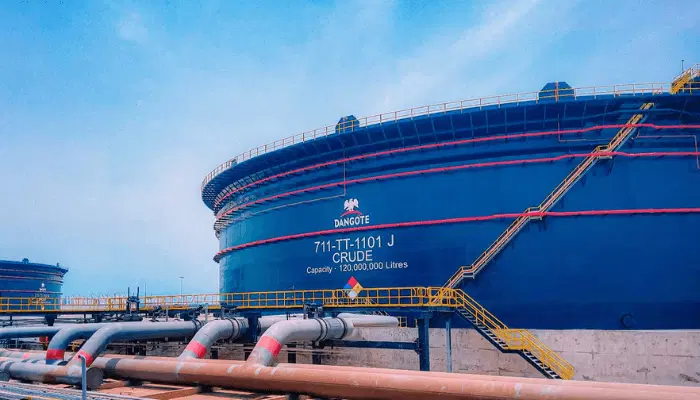Numerous petroleum marketers suffered significant losses as a result of the Dangote Petroleum Refinery’s decision to lower the ex-depot price of Premium Motor Spirit (petrol) on Saturday night.
According to marketers who spoke with the media, the Dangote refinery’s abrupt price cut may have been prompted by recent concerns that some traders would turn to importation if the foreign PMS continued to be less expensive than the ex-depot rates of locally refined goods.
Nigerians were informed on Saturday evening that the refinery, which has a capacity of 650,000, had lowered its price per litre from N950 to N890.
“Dangote Petroleum Refinery has boldly lowered the ex-depot price of Premium Motor Spirit, also known as petrol, from N950 to N890 per litre, with effect from Saturday, to provide economic relief for Nigerians.
“A substantial drop in the price of crude oil internationally and positive developments in the global energy sector are the reasons for this price adjustment.”
Anthony Chiejina, the Group’s Chief Branding and Communications Officer, said in a statement that the Dangote refinery’s choice demonstrates its dedication to conforming to market realities and making sure that consumers profit from shifts in global crude oil prices.
According to the statement, the price cut would result in a considerable decrease in the cost of petrol nationwide, which would have a good knock-on effect on the entire economy.
Additionally, the refinery has urged marketers across to make sure the Nigerian people benefit from the lower pricing.
Marketers, however, stated that the price cut has both beneficial and detrimental consequences for their company.

It was discovered that several merchants who purchased the product just hours before the announcement would have to sell it for less than the cost, which would result in debts totalling millions of naira.
Hammed Fashola, the vice president of the Independent Petroleum Marketers Association of Nigeria, told reporters in an interview that while the price cut is a positive step, it will undoubtedly have both positive and negative effects on business.
Fashola discussed the detrimental impact of the cut, saying, “For example, perhaps a marketer bought some merchandise on Friday. The marketer probably wouldn’t have sold it before the recent cut. That’s the worst thing about it. However, we must follow it. We must put up with it. That’s what deregulation is so good at.
“Therefore, we must exercise caution when buying our merchandise. which store we get it from and how much it costs. And we need to know enough about what’s happening. to prevent daily financial losses,” Fashola said.
He stressed that a marketer’s only choice in the event of a price drop is to lower the price to sell off old stockpiles; otherwise, he would be left without any buyers.
“A marketer’s only choice in such a situation is to lower the price. Because the competition will start if you don’t do it.
“Some local traders may be fortunate enough to receive their products tomorrow for N890. Therefore, if you have a N950 product on hand, you will have no choice but to pull it down within two or three days. Marketers are currently in that predicament, but we must deal with it. The losses are borne by the marketer,” he said.


 Trending
Trending 